America’s representative declares: “America…not perfect”
PHOTO: Pres. George Manneh Weah (2nd from right) arriving at the celebration venue
By Samuel G. Dweh—Freelance Writer & Journalist; Author (of Books)
Member—Press Union of Liberia (PUL); former president—Liberia Association of Writers (LAW) Contact channels: (+231) 886618906/776583266/samuelosophy@yahoo.com, samuelosophy1@mail.com
GEORGE WEAH’S PRE-BICENTENNIAL CELEBRATION “LEGACIES”
In spite of his Government’s “financial handicaps”, President George Manneh has out-performed each of his predecessors—Charles Taylor (1997-2003) and Ellen Johnson Sirleaf (2006-2017)—on following: provision/creation/pavement of roads nationwide; national electrification (including replacement of wooden street light poles)— Nation’s Capital City and many of other Counties’ capitals; national honors for officers of the Armed Forces of Liberia (shown with completion of the “14 Military Hospital” begun during Ellen Sirleaf’s presidency), and tuition-free education at the State-owned University of Liberia. Just to name a few of the many legacies! Thanks to the European Union that’s financially standing fully behind Mr. Weah—like the United States of America did for Madam Ellen Johnson Sirleaf’s Government from beginning to end.
Mr. Charles Taylor’s development-related presidential “foot prints” weren’t “deeper”, which many people attribute to a well-orchestrated “undermining” from “superior external forces”
The only sector The Weah’s Government has impressed most of the citizenry is promotion of the Nation’s Tourism sector. Since Mr. Weah became Head of State in January, 2018, the Country’s popular tourism sites have been “ignored” by his administration. One example is the Sarpo National Park in Sinoe County, located in southeastern Liberia. Another Tourism site is the Providence Island, venue of the Bicentennial celebration, hosting a symbolic “May Flower”—the Ship that transported the freed black slaves to Liberia. Foreign tourists would wish to see this “slaves ship”.
The George M. Weah-led Government is practically ignoring the “National Export Strategy on Tourism” for a five-year period (2016-2020), launched by the Government of Ellen Johnson Sirleaf in 2016. During her Foreword Statement about the Project, President Sirleaf said: “Over 560 kilometers of coastlines characterized by a never unbroken sand-strip, warm Atlantic water, and some of the largest sea waves in the world make Liberia an ideal destination for surfing. With our border, 40% of the West African rainforest can be discovered. The gives visitors an exclusive peek into the unbound natural beauty of the surrounding landscape, unique in its rare flora, fauna and widelife.”
But President Weah continues creating an impression in his presidential colleagues at the United Nations General Assembly about his ‘prioritization of Liberia’s Tourism Sector’. This was in his Address to the UNGA in 2020, and again in 2021. He may insert that in his Address to the 2022’s edition of the UNGA.

The President and Vice President on a banner at the Bicentennial celebration venue
THE BICENTENNIAL CELEBRATION…
ATTENDANCE
On Friday, January 7, 2022, Liberians and Liberia-based citizens of other countries began trooping to the Providence Island—first settlement for freed black slaves in 1822 (as stated in Government’s Gazette) Some reached the celebration’s venue 6am, especially those who had come from other counties and wanted to be the “first to enter the venue”. But the Presidency-authorized Protocol at the entrance prevented entry of the “earliest participants”, until “10am”—two hours to the presidentially proclaimed time for start of the program. The heads of some of those denied entry were covered with a red beret with the “political logo” of the national ruling political party—Coalition for Democratic Change (CDC).
Few minutes later, commotion sparked between some of the “CDCians” and some members of the entry security (Protocol) over being barred from entry. Angered by the security’s action, a lady with beret confronted one of the Protocol officers with words. She said, she and many of her colleagues being prevented from entering the venue had sacrificed their lives for CDC during elections in 2005, 2011 and 2017, when some of the now-Protocol officers were not around, so she and her beret-wearing colleagues should be given priority to enter the venue of a public event where CDC’s Political Leader is expected. Some of her “partisans” joined her on verbal attacks against security officers, but the Protocol officers couldn’t succumb to these other CDCians’ politically motivated pressure by ushering them in.
Between 9am and 11am, the entry point of the Liberian Historical Site and inside the premises were swarmed with people—majority in traditional attires representing various tribes of Liberia. Some officers of the Liberia National Police (LNP), maintaining order and ensuring a peaceful atmosphere, were displaying their guns as if they were in “war time”.

The Author (first from left) posed with some of weapon-brandishing LNP officers
The entire space of the Providence Island was decorated with flags of Liberia’s 15 Counties, bill boards with photos or images of popular Liberians during the indigenes-settlers engagements, former Liberia’s Presidents (from 1847-2017), internationally recognized Liberia’s representative at the United Nations, educators, etc. (Some photos featured, below)
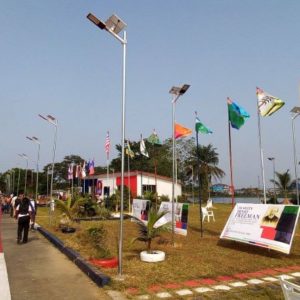
Flags of Liberia’s 15 Counties hoisted at the celebration. Part of the VIP reception rug in view


Bill board with photos of Presidents William V.S. Tubman, Samuel Kanyon Doe, and Charles McAurthur Taylor
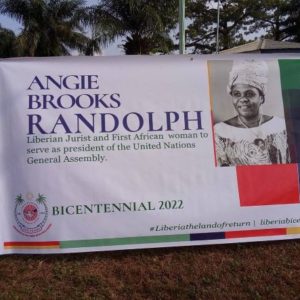
Billboard of Liberia’s first female representative to the United Nations
The Country’s Disabled Community was represented by the National Commission on Disabilities (NCD), headed by Madam DaINtowon Paye-Bayee (Executive Director)
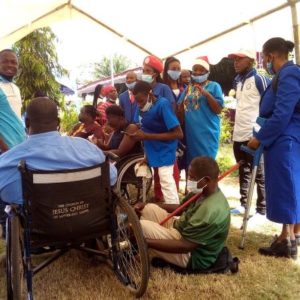
Some of the Disabled Community’s representatives at the event
Creators with their works (sculptures, paintings, hand-woven wears) occupied the south side of the venue, behind representative team of the Ministry of Health.

Creative Works section of the celebration venue
Various Junior and Senior High schools’ representative bodies were present. Two of the schools were: Nathaniel Varney Massaquoi Elementary School (located in the densely populated Township of West Point), and G.W. Gibson High School, located along the Tubman Boulevard in Capitol Bye-Pass.

Representative body of Nathaniel Varney Massaquoi Elementary School—West Point Township
PERFORMANCES
The sounds of cultural drums, cultural songs, flutes, Sasa (hallowed dry wood tied in stringed shells) from members of being-represented cultural and non-cultural groups filled the air inside the Providence Island, beginning from 10am. One of the non-cultural groups was a “Praying band” (Women In Peace Network—WIPNET), founded during Liberia’s first post-war election time, for invocation of God’s presence against resurgence of war-like hostilities in any post-war presidential and legislative elections.
Some of the dancers extended their choreographical performances on the rug laid for the Head of State and other VIPs (Very Important Persons) to walk on.

National Culture Ambassador, Juli Endee, arriving at celebration venue

One of the masked dancers at the celebration
The arrival of Head of State George Manneh Weah, 11am, caused eruptions of singing, clapping, trumpeting, and drumming. The movement of each of his hands—symbolizing his non-verbal response, “Thank you for welcoming me”—seemed to have cast a “spell” of further inflaming the “jubilation mood” in most of those lined up along the long cemented corridor covered with red rug.
On cultural performances—songs, dances, and dramatization, Madam Juli Endee, National Culture Ambassador (she displayed with songs and dance), was the Coordinator. For the Counties on dance and songs (male and female categories, individual performance), only five—Grand Cape Mount, Grand Gedeh, Bong, Nimba, and Grand Bassa—were called, and the entire southeastern (except Grand Gedeh), comprised of six Counties, did a ‘group performances’. The English versions of ‘Bicentennial songs’ were done by popular Liberian musical stars. One of them, male, talked about stories about Liberia being rich with national resources, but citizens outside of the leadership circle can’t see the “impact” of presence of the ‘”abundance resources”.
The dramatization component of the Bicentennial celebration, done by the Liberia Movie Union (headed by Mr. Eddie Mantu Gibson as president), was about appearance of “strangers” (freed slaves/settlers) at the waterside (later named Providence Island), “flight” by “villagers” washing their clothes and their reports (in dialect) on the “intruders” to the traditional leadership of the Village, and assimilation of the settlers into the Town.
SPEECHES/REMARK & PRONUNCIATION/ENUNCIATION ISSUES
My adding “pronunciation/enunciation issues” to this article is for highlighting the serious “oral English deficiency” with majority of Liberian leaders (in Government and the private sector), and to tutor them on the “right sound” (phonetics) This “dictional impairment” was unconsciously exhibited by two of the more powerful Liberian Government officials who officially spoke at the Bicentennial celebration. The “enunciation issue” with the Ambassador of the Embassy of the United States of America is also highlighted.
However, I also featured each person’s “newsworthy comment” (the Author’s opinion)
SPEECH/REMARKS: LIBERIAN SPEAKERS.
I will begin with Liberian speakers before the only foreigner who spoke at the event. I list them according to the Program’s order for each to speak.
Mr. Ledgerhood Rennie, Minister—Ministry of Information, Cultural Affairs & Tourism (MICAT)—served as Master of Ceremony of the indoor segment of the Bicentennial celebration.
Remarks:
On his “newsworthy comment”, he said some invited Speakers at program do not have written, and are not intellectually prepared for impromptu presentation. He gave, as an example, his personal knowledge of a Keynote Speaker at a program in Sodoken District of Maryland County, who was searching all pockets on his shirt and trouser while speaking.
Enunciation issue:
He earned 99.8% for his outstanding pronunciations and enunciations of English words during his presentations. His only “linguistic problem” was his failures on the proper sound of the “th” in words he called. However, majority of the other participants (including this Author) commented on his “standard English” over those of other Liberian speakers at the indoor program.
Author’s Note: To properly pronounce any word that begins or ends with “th”, place your tongue between your upper and lower rows of teeth (Rule of Phonetics)
JEFFERSON TAMBA KOIJEE, MONROVIA CITY MAYOR
Speech:
On his “newsworthy comment”, he said Liberian leaders often preach about “unity or unification”, but a large percentage of the citizenry are not seeing the realization of the unity or unification.
Enunciation Issue:
He kept making mistakes on the proper sounds of the last three letters of his Country’s name, erred every time he call a word beginning or ending with “th”, produced “po” sound for the last three letters of “people”. He made many phonetical errors similar to the ones by the Head of State.
Other “Liberian speakers” were Juli Endee, National Culture Ambassador; and leader of the National Traditional Council of Liberia. Each of them caused “deformity” on many English words during their presentations/Remarks.
FOREIGN SPEAKER AT THE CELEBRATION
Only Mr. Michael A. McCarthy, Ambassador of Embassy of the United States of America, was the only speaker at the event.
Speech:
On “newsworthy comment”, he declared: “Two hundred years later, America is not perfect, still not perfect.”
Enunciation issue:
On pronunciation or enunciation, he was the top performer on the entire list of prominent persons who officially spoke at the program. Majority of longer (English) words during his speech were distinct (clear) However, he flung on the “th” sound, and experienced some hitches when calling the seven tribes of Liberia. Two examples: 1. He said “Glaybo”—instead of “Grebo”—when calling a tribe of Southeastern Liberia. 2. He said “Kroo” (long sound)—instead of “Kru” (short sound)—when on a tribe of Southeastern Liberia. He earned 99.9% from me on his “pronunciation/enunciation effort” The mispronunciation of “Grebo” got my media colleague Robert Dixon (working with the Liberia News Agency), standing near me, ‘disenchanted’ and he verbally reacted (in a low tone): “Mr. Ambassador, please get the name of my tribe right next time.”
Dr. William Ezra Allen, (Head of the History Department of the University of Liberia) He spoke on the topic “The Historical Significant of the Bicentennial Celebration”, with a subtitle “Promoting Liberia’s Enduring Legacy”.
Speech:
On his “newsworthy comment”, he said one of the bound-for-slavery Africans rescued on the high sea was a Liberian named Daniel, and two of the settlements formed by the “Congo people” (a name given to bound-for-slavery Africans rescued on high sea in the Congo) are are “Matadi” (created in1861) and “Paynesville” (created in 1865)—both in a predominantly “Congo Settlement” (Montserrado County)
Enunciation issue:
He earned 90% for producing the wrong sound on each of the words beginning or ending with “th” in his speech, and for producing a “ro” sound for “ria” (last letters in the name of his Country)
HEAD OF STATEGEORGE MANNEH WEAH.
Speech:
On his “newsworthy comment”, he said: “If you are not excited today, I don’t know when you will be excited”. His second “newsworthy comment” is his disclosure about his Government’s plan to invite all opposition political parties’ Leaders to the celebration of the National Unification Day (February 14) Author’s Note: No leader of any of the opposition political parties was seen at the venue of the indoor segment of the event.
Enunciation issue:
The President earned 80% for producing “ted” sound for each of the words beginning or ending with “th”, producing “ro” sound for “ria” (last letters for his Country’s name), produced “po” sound for the last letters in “people”, and for omitting the “s” in many of the plural nouns. One example: When referring to “more than one Liberian”, the President said “all” but left out the “s” in the Country’s name. Other enunciational errors committed by the Head of State are “settolors” sound for “settlers”, “nat” sound for “not”, and “geder” sound for “gether” (to-gether)
POLITICAL EXCLUSION/SNUB OF THE BICENTENNIAL CELEBRATION
None of the most popular pre-war Liberian cultural icons—who regularly featured in cultural events or were members of a Cast of a movie shot a the Providence Island—never came out for performance or make brief remark (about pre-war national cultural activities) Many of the Bicentennial celebration participants, who were adults during pre-civil war Liberia, had expected at least two of these “reservoirs” of the Country’s cultural history to take the post-war people down memory lane of how it was yester-years. None came out
Two of the pre-war performers, present at the Bicentennial celebration, are Kekura Kamara and Bendu Kiazolu. The former was a member of the National Culture Troupe and a regular face in the national wave-making comic movie, “Malawala, Balawala” (a episode had been shot at the Providence Island—venue of the Bicentennial celebration), and is now president of the Liberia National Cultural Union in post-war time. The other, Bendu Kiazolu, was a member of the National Culture Troupe. But none of the nationally popular pre-war cultural icons was featured. While writing this article, another pre-war cultural icon, working in the George Manneh’s Government, told he Kekura Kamara was left out on his “political difference” with President Weah. “Mr. Kamara is a member of the Alternative National Congress, ANC, founded by Mr. Alexander B. Cummings, ran campaign for ANC in the Legislative and Presidential elections in 2017, and was given a white Toyota Landcruiser Jeep by Mr. Cummings or the Party,” the Government official told me on condition of anonymity.
Some sources had told me Mr. Kamara and civilian George Weah were “inseparable friends” during the latter’s professional football days. “Kekura taught George Weah cultural dance; George Weah recommended Kekura’s cultural troupe for the World’s Cultural Festival in Milan, Italy, where George was playing, and sponsored the troupe’s trip to the Festival,” another pre-war member of the National Culture Troupe told me before the Bicentennial celebration.
During his speech, President Weah never mentioned the name of any of the Liberians who had kept the Bicentennial celebration venue “culturally alive” on weekends and during Holidays.
Former President Ellen Johnson Sirleaf was physically absent on bereavement—dead of her son, James Sirleaf, President George M. Weah informed other participants during the indoor program. The First Lady. Mrs. Clar Weah, was physically absent on “injury of our son, Timothy Weah,” the Head of State reported to the body of the celebrants.
POOR PLANNING-RELATED NATIONAL DISGRACE
The Liberia’s 200th Nationhood celebration had its “ugly sides”, caused by what somebody will describe “governmental ineptitude”. This was a national disgrace, especially considering two of the “ugly sides” happening while foreign dignitaries were in attendance.
The first “governmental ineffectiveness” was reflected in the cleanup of the celebration’s venue (Providence Island) on the day of the event (January 7, 2022), and presence of plastic, paper and wooden wastes near gathering of participants waiting for arrival of the Head of State. A pile of plastic wastes (empty pure water sachets), metal and wooden wastes were two yards from the main corridor (covered with the rug for the President’s entry), near the urinal/defecation house (where some persons displayed their cultural artifacts—painting and fabrics) My proofs are in my photos (below) taken on the day of the celebration. (All other photos featured in this article were taken on the same day) The entire perimeter of the venue (with the sea) was lined up with empty.
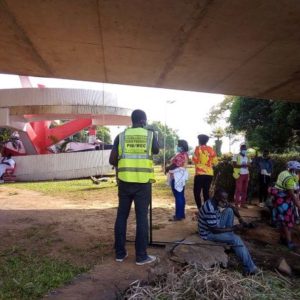
Monrovia City Corporation’s workers cleaning the celebration venue on the event day
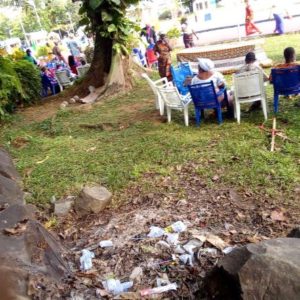
Pile of wastes (empty drinking water sachets, left-over papers, etc.)0 behind a row of participants’ seats adjacent the Toilet/Urinal House
The third—and outstanding Government-caused national disgrace—was sudden electric power outage twice when Dr. Allen was speaking on the historical significance of the Bicentennial celebration. The Information Minister “trivialized” this national embarrassment by announcing: “LEC (Liberia Electric Corporation) is just batting its eyes.” This happened in the presence of the representative (Ambassador) of the United States Government that had pumped million of (US) dollars into the Liberian electricity sector (during George Weah’s presidency) for “stabilization” of the Country’s electrification. The European Union has also pumped in huge amount for the same purpose, especially revitalization of the Mount Coffee Hydro Plant (for nationwide electrification) destroyed during the Country’s civil war. However, over 60% of homes around the Country do not have electricity from the EU-sponsored revived Mount Coffee Hydro.
Another “national disgrace” was neither air condition nor electric fan was at the VIP spot—where the Head of State, U.S. Ambassador, and other VIPs were seated. Some of them were using their handkerchiefs and the program sheet as “fan” to reduce the heat at the space.
The other “Bicentennial celebration embarrassment” was urination of female participants in an open place (behind) a hut, near group of men, because the only two unrination/defecation spaces (in a small tiny buidling) was overwhelmed by other participants. The absence of water to flush the water was a major problem associated with the “Rest Room” issue.
In spite of his Government’s “shortcomings” on the Bicentennial celebration planning, etc. (mentioned above), the name “George Manneh Weah” has gone down in Liberia’s History of “Liberia’s Presidents’ Legacies” as the first post-civil war Liberian Head of State who “planted” seed of a “new cotton tree” (during the Bicentennial celebration) to replace one of Liberia’s two oldest “cotton trees“ that had lived 170 years (from the day the May Flower arrived with the freed slaves on this piece of land later named Providence Island—venue of Bicentennial celebration. This is another legacy—apart from the ones I had listed in the first paragraph of this article. He was led to the planting place and assisted by the representative body of the Liberia National Traditional Council. Only the Head of State and Traditional Leaders were allowed into the metal and wooden cubicle created for the seeds planting—in fulfillment of the “warning” from the representative body of the Liberia National Traditional Council of Liberia during the indoor segment of the program. This “warning” shocked the other Bicentennial celebration participants, especially Journalists who wanted to take photos of President Weah planting the seeds and to promote the photos in their various stories or articles. The “secret planting” made the activity appear as “occultic event” to some participants, instead of the “public function” it was expected to be.
Because of the two cotton trees’ inches-closeness and intertwine of their roots, many Liberians had been describing them as “husband and wife”.
This article doesn’t cover all the comments during indoor segment of the Bicentennial celebration. You can get in local dailies or newspapers’ online platforms other information about the celebration you had wished to see in my write-up, but did.
I, an indigene of Grand Kru County, stand with my kinsman (Head of State George Manneh Weah) on his presidential performance, but…
We meet again at another Bicentennial celebration-, if….
About the Author:
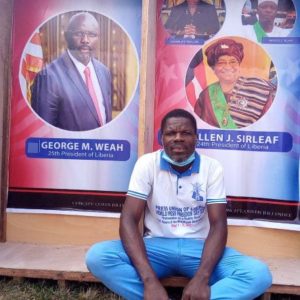
Author posing with one of the billboards at the Bicentennial celebration
Samuel G. Dweh is a member of the Wedabo ethnic group of Grand Kru County, situated in the South-Eastern part of Liberia. He’s a member of the Press Union of Liberia (PUL), and former president of the Liberia Association of Writers (LAW), a writing coach (feature article, fiction writing/Literature), Diction Tutor (enunciation), and Publisher/Managing of Edu-Diary (12-page education newspaper) He can be reached via: —+231 (0)886618906/776583266/samuelosophy@yahoo.com
Academic self-introduction: The writer of this article—a native of Grand Kru County, located in southeastern Liberia—is a High School student (stopped at 12th grade since 1997)….the power of reading widely/extensively. He had served in all the positions in the print media: Reporter, Sub-editor (Proofreader), News Editor, and Editor-In-Chief with seven different Liberian newspapers—including Daily Observer—from 2011-2016. This information is a counter against the majority’s perception or argument: Only a university graduate can produce academically/intellectually high quality works. The information is also a patriotic call to the Liberian Government and Liberia’s Development Partners (USA, China, UNESCO, UNICEF, etc.) to PROMOTE READING CULTURE through the RIGHT ROLE MODELS (AVID READERS & WRITERS)
PRO-BONO PATRIOTIC SERVICE & CLARIFICATION
This article is the Author’s FREE CONTRIBUTION (based on patriotism) to the George Manneh Weah-led Government’s celebration of Liberia 200th Year of Nationhood. My contribution through an article is based on my knowledge of many highly educated readers’ preference for an “article”—based on its capture of “more details” and with “descriptions” of some of the actions (for readers not physically present at the event)— than they do for a traditional “newspaper’s story” that focuses much on only “venue” and “comments” (Keep It Short and Simple—KISS) This article was produced on the Author’s own resources—the money to get him to the celebration and to return home (after the main action), the gas that powered the electric power generating set on which his computer was connected during typing for four days, and the Internet data on which the article was shared with media colleagues to publish in their newspapers and online platforms, as well as Government officials and people in the United Nations System. The writer of this article was not one of the Government’s “officially invited media persons” to cover the Bicentennial celebration (even though he had discussed with some persons in the presidential circle about his yearning to attend and write a feature article about the event), but participated due to its “national significance” and on his professional philosophy that “a writer should not wait for official invitation to be a part of positive national event to write about it”. None of the “officially invited journalists”
The “national disgrace” component of the article isn’t meant to bring the George M. Weah’s Government to national and international “ridicule”; rather, it’s the Author’s way of saying to the Government, “Do it right next time, so that other countries of the Global Community won’t perceived as incompetent on national historical event planning or celebration.” The President’s or Government’s “errors” should also highlighted in our journalists’ reportage, along with the “successes”. Doing only Public Relations work (praise-singing) will cause “complacency” by the Head of State or other political leaders—including those from the opposition political bloc.
AUTHOR’S NOTE: This article is made up of these phases (main parts) of the Bicentennial celebration: Attendance, Performances, Speeches/Remark & Pronunciation/Enunciation Issues, Political Exclusion (of pre-civil war cultural icons, still alive), & Poor Planning-Related National Disgrace

